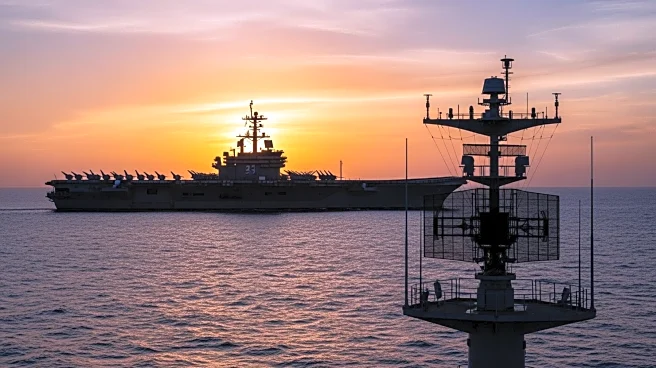What's Happening?
The USS Gerald R. Ford, the world's largest aircraft carrier, has arrived in the Caribbean Sea as tensions between the United States and Venezuela escalate. The carrier, accompanied by over 4,000 sailors
and tactical aircraft, joins 15,000 U.S. service members already in the region. This deployment is part of 'Operation Southern Spear,' a mission announced by Defense Secretary Pete Hegseth aimed at defending the U.S. homeland and combating narco-terrorism. The U.S. has conducted multiple strikes on boats suspected of drug trafficking from Venezuela, and a $50 million reward has been set for the arrest of Venezuelan leader Nicolás Maduro.
Why It's Important?
The deployment of the USS Gerald Ford signifies a potential escalation in U.S. military involvement in the Caribbean, reflecting heightened geopolitical tensions with Venezuela. This move could impact U.S. foreign policy and military strategy in the Western Hemisphere, as well as relations with Latin American countries. The operation aims to curb drug trafficking, which is a significant concern for U.S. national security. However, the presence of such a large military force could also provoke a response from Venezuela, potentially leading to further instability in the region. The situation underscores the complex interplay between drug enforcement, military strategy, and international diplomacy.
What's Next?
The U.S. administration is continuing high-level discussions with Congress and foreign leaders to determine the next steps. While President Trump has not confirmed military action against Venezuela, the situation remains fluid, with ongoing military exercises and strategic deployments. The international community will be closely monitoring developments, as any military action could have far-reaching consequences for regional stability and U.S.-Venezuela relations. The U.S. government may also face domestic and international scrutiny over its approach to handling the situation, particularly regarding the use of military force.
Beyond the Headlines
The deployment raises ethical and legal questions about the use of military force in drug enforcement operations. The resignation of Admiral Alvin Holsey, who opposed the strikes on alleged drug boats, highlights internal disagreements within the U.S. military. The situation also reflects broader issues of sovereignty and intervention, as the U.S. navigates its role in addressing transnational threats while respecting the autonomy of other nations. The outcome of this operation could influence future U.S. military and foreign policy decisions, particularly in regions with complex geopolitical dynamics.









